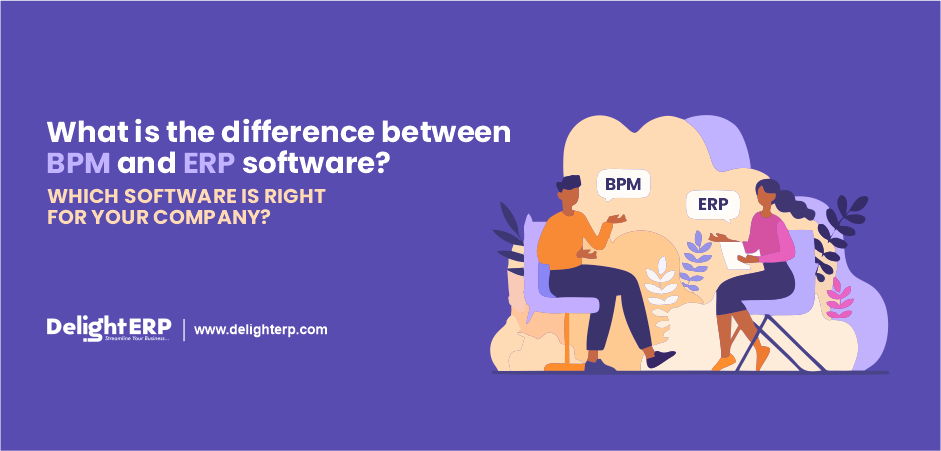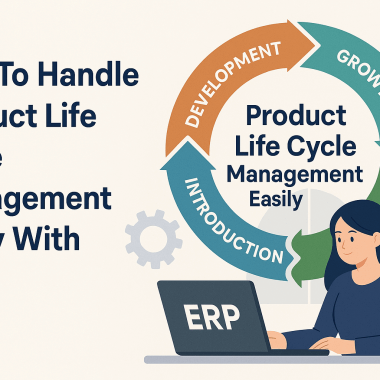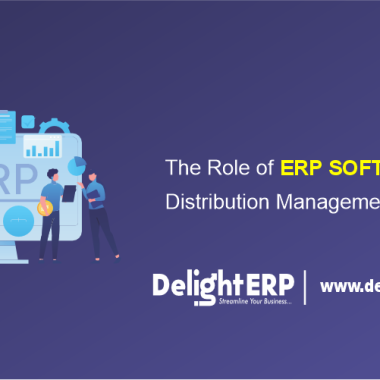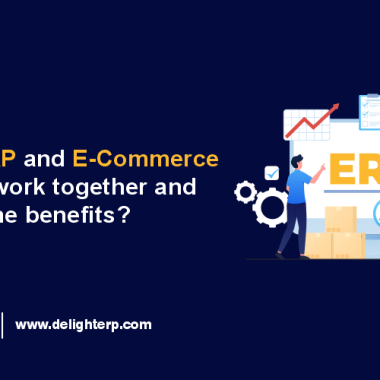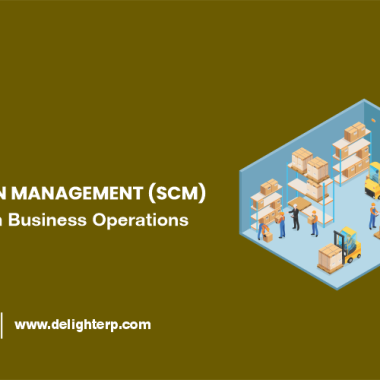Introduction
While choosing between ERP Software and BPM tool can be quite difficult for companies because both systems intersect what your business needs to succeed. Since the implementation of the systems focuses on enhancing efficiency and profit and decreasing costs. ERP Software and BPM tool help deliver work faster and more efficiently.
However, despite the similarities, there are differences between ERP and BPM. It’s important to understand the role each one plays so you can decide which software is best for your company.
What is ERP?
Enterprise Resource Planning (ERP) indicates a type of software that organizations use to manage day-to-day business activities such as supply chain management, manufacturing, inventory management, accounting, project management, risk management and compliance, product lifecycle management, procurement, and many more.
An ERP solution’s main goal is to store and pull data from a common database, allowing a single source of truth. A complete ERP suite also comprises enterprise performance management, software that helps plan, budget, predict, and report on an organization’s financial results.
ERP systems associate a multitude of business processes and allow the flow of data between them. By gathering an organization’s shared transactional data from multiple sources, ERP software removes duplicate data and provides data integrity with a single source of truth.
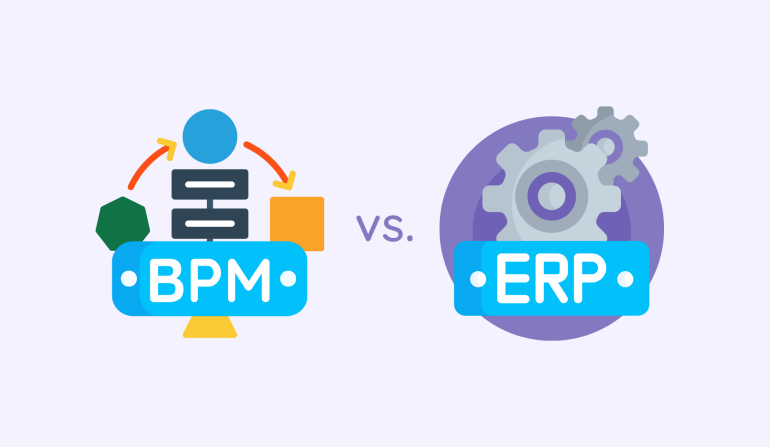
ERP Software Features include:
- HR Management
- Manufacturing
- Real-time Data
- Automation
- Accounting
ERP Software benefits include:
- Monitor and Boost Customer Satisfaction
- Reduce Costs
- Supervise Supply Chains
- Leverage Scalability
- Verify and Meet Compliances
This centralization allows all employees to work with the same set of data. Companies do not need to stand by while different departments work with outdated stock levels or ledgers.
ERP gives other benefits, such as:
- Supervising all supply chain features.
- Monitoring and increasing customer satisfaction.
- Decreasing costs and time as you boost productivity.
- Gathering business intelligence (BI) data to make more-informed business choices.
- Giving scalability as you upscale or downsize your business.
- Confirming your company aligns with all standard and regional compliances (i.e., ISO, FDA, and more)
What is BPM?
Business process management (BPM) software is a solution comprised of various strategies and techniques to automate workflows the organization uses to serve its customers and generate business value. This system gives process modeling tools to design and edit workflows. Process modeling permits you to add descriptions to inform others about what happens during workflows.
BPM uses multiple methods to improve a business process by analyzing it and modeling how it works in different structures, implementing changes, monitoring the new process, and continuously upgrading its skill to drive desired business outcomes and results.
BPM is a wide discipline and by definition, a dynamic one given how the organizational roles, rules, tactics, business goals, and other elements it surrounds are constantly changing. For many years, BPM has accommodated diversified optimization methodologies.
BPM Features include:
- Scalability
- Knowledge management
- Mobility
- Real-time reports and Analytics
- Integrations
BPM Benefits include:
- Meet compliances
- Increase Productivity
- Manage Data Accessibility and Protection
- Simplify Internal and External Collaboration
This characteristic helps you include instructions for specific tasks.
As business processes at a few companies become too large and complex to be managed without the aid of automated tools, BPM software products were developed to support large-scale business change. BPM’s traditional focus on back-end processes has transferred to now include the optimization of customer and employee systems of engagement.
Difference between BPM and ERP software
ERP is about modules and functions.
The definition of BPM is still a lot like the definition of ERP. ERP systems concentrate on various business functions and modules. ERP can also track module data. This solution tracks every single thing from sales to employee wages, all while allowing the free flow of information between modules.
BPM offers workflow customization.
Let’s assume that you need software to manage one specific HR workflow. An ERP vendor can only provide the entire HR module, which can be costly if you are not gaining from all the available features. BPM software allows your business to manage that workflow with a level of customization that ERP systems don’t possess.
ERP process management exists, but ERPs don’t always give the same granular data as a BPM system. Both types of software use BI tools but differ in the scope of their analysis.
Both Provide Business Intelligence.
ERP system and BPM system both provide analytics using your KPIs and custom reports. Nevertheless, BPM can track particular process efficacies. BPM’s BI capabilities insight into process execution times, statuses, and the number of open and closed procedures.
ERP provides data storage and visibility.
Comparing ERP and BPM for data storage and transparency, ERP wins. ERP stores data on a central server giving different departments input data, and it all gets stored in one location. This centralization reveals how the company and its functions collaborate.
ERP provides users with a holistic view that BPM cannot offer. It also stores much more data, giving extensive analysis across all business functions showing how each is interrelated. This solution gives almost-infinite functions and requirements that stretch.
Can ERP and BPM systems use together?
The answer is yes, you can use these systems as a joint ERP BPM system.
Much of the confusion around BPM and ERP stems from the fact that they carry out the same job in some instances when used separately. Ironically, you observe the differences between the two systems best when used together as an ERP business process solution.
Generally, BPM is integrated into a more considerable ERP system to manage what ERPs can’t. This gap can lead to numerous company incompetency and boring workarounds as you resolve them.
A BPM’s intensified analysis strengthens the process, allowing the more extensive ERP to facilitate more general business functions. If integrated perfectly, the two can complement each other. You can have automated process management that detects the use of resources and assigns tasks along with centralized data storage and collaboration.
Which software is right for your company?
At first instance, BPM works great for companies looking to automate and scale repeatable processes, alternatively, ERP does a great job of managing massive data concisely into one authentic source of truth.
So here the question arises, which do you choose? How do you decide which solution will work best for your business?
Thus here are a few tips to help you determine whether your company needs a BPM or an ERP system. Firstly it’s appropriate to understand that BPM is designed to assist serial work.
If your company:
- Works with a collection of repeatable processes.
- Accomplish work serially.
- Employs several steps that need particular staff to complete them in a sequence.
then BPM would generally be the best option for your organization.
BPM empowers organizations to do difficult work with accuracy by:
- Break it down into steps
- Following the process serially, and
- Returning for changes until the desired result is delivered.
Alternatively, if your business:
- has a massive pool of data
- gets data pulled randomly by staff across all departments
- need higher data transparency for staff to do their work, and
- has to manage difficult volumes of data interacting with each other across the organization, you will find that ERP would meet your organization’s needs quite suitably.
ERP is suited to the requirement of larger organizations where data is randomly used and there’s a need to maintain a singular, advanced source of truth across the entire organization.
Most large organizations use both BPM and ERP. The ERP system controls all the database requirements, and the BPM system controls the flow of data between the ERP system and other important tools.
As your organization grows, both of these systems will become essential, so putting them into place early helps your team be used to taking benefit of the best technology to scale your business.
Conclusion
If you’re looking for a solution that can manage your business functions across your company with a heavy focus on storing data in a shared database, ERP is the software for you.
Delight ERP software in Rajkot, Gujarat, India is a significant cloud-based solution. Here ERP Software development is done for small, medium, and large-sized enterprises with the latest technology.

